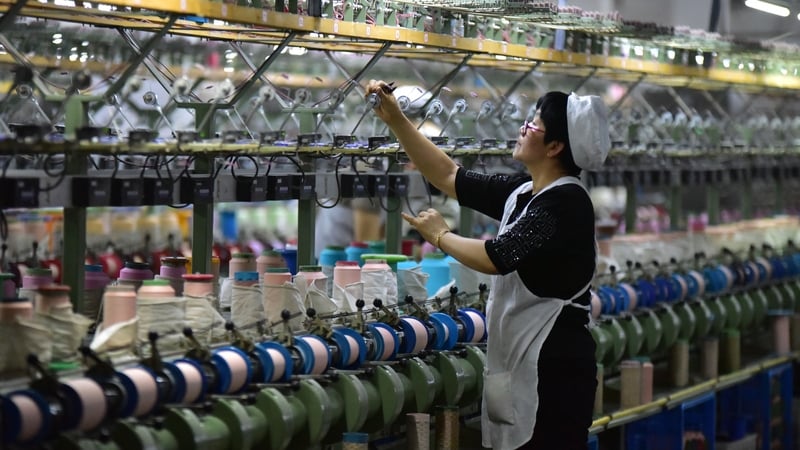China will pay no attention if the United States continues to play the “tariff numbers game”, China’s foreign ministry has said, after the White House outlined how China faces tariffs of up to 245% due to its retaliatory actions.
In a factsheet earlier this week, the White House said China’s total duties include the latest reciprocal tariff of 125%, a 20% tariff to address the fentanyl crisis, and tariffs of between 7.5% and 100% on specific goods to address unfair trade practices.
US President Donald Trump announced additional tariffs on all countries two weeks ago, before suddenly rolling back higher “reciprocal tariffs” for dozens of countries while keeping punishing duties on China.
China raised its own levies on US goods in response and has not sought talks, which it says can only be conducted on the basis of mutual respect and equality.
Meanwhile, many other nations have begun looking at bilateral deals with the US.

Last week, China also filed a new complaint with the World Trade Organisation expressing “grave concern” over US tariffs, accusing the US of violating the global trade body’s rules.
China this week unexpectedly appointed a new trade negotiator who would be key in any talks to resolve the escalating tariff war, replacing trade tsar Wang Shouwen with Li Chenggang, its envoy to the WTO.
The US said Mr Trump was open to making a trade deal with China but that the Asian nation should make the first move.
Unease grows over tariffs despite ‘progress’ in Japan talks
Meanwhile, uncertainty over Mr Trump’s tariff blitz has mounted after the Fed chief warned of rising prices and “volatility” while “progress” flagged by the US president in talks with Japan lifted markets slightly.
Mr Trump is banking that his tariffs will lead to a bonanza of beneficial trade deals, lowering barriers to US products and shifting global manufacturing to the United States.
However his trade negotiations – including with Japan yesterday – are proceeding against a backdrop of deepening confrontation with China and mounting concern over widespread disruption.
Federal Reserve boss Jerome Powell said yesterday that tariffs are “highly likely” to provoke a temporary rise in inflation and could prompt “more persistent” price increases.
We need your consent to load this rte-player contentWe use rte-player to manage extra content that can set cookies on your device and collect data about your activity. Please review their details and accept them to load the content.Manage Preferences
He also noted the “volatility” in the markets at a “time of high uncertainty.”
That unease hit Wall Street, where the Nasdaq at one point plummeted more than 4%, the S&P more than 3% and the Dow Jones more than 2%.
Chip manufacturer Nvidia momentarily dropped more than 10% after disclosing major costs due to new US export restrictions on sending semiconductors to China.
World Bank chief Ajay Banga echoed Mr Powell, saying that “uncertainty and volatility are undoubtedly contributing to a more cautious economic and business environment.”

WTO head Ngozi Okonjo-Iweala said the uncertainty “threatens to act as a brake on global growth, with severe negative consequences for the world, the most vulnerable economies in particular.”
After meeting Japan’s tariffs envoy, Mr Trump posted on his Truth Social platform that there had been “big progress”.
However after Ryosei Akazawa concluded his talks with Treasury Secretary Scott Bessent and Trade Representative Jamieson Greer it became clear that no immediate breakthrough was made.
“Of course, the discussions going forward won’t be easy, but President Trump has expressed his desire to give the negotiations with Japan the highest priority,” Prime Minister Shigeru Ishiba said in Tokyo.
“We recognise that this round of talks has created a foundation for the next steps, and we appreciate that,” Mr Ishiba said.
But he added: “Of course there is a gap between Japan and the US.”
Japanese companies are the biggest investors into the US and Japan is a vital strategic ally for Washington in the Asia-Pacific region.
Nonetheless Japan is subject to the same 10% baseline tariffs imposed by Mr Trump on most countries as well as painful levies on cars, steel and aluminum.
Mr Trump reportedly wants Japan to buy more US defense equipment and to do more to strengthen the yen against the dollar.
Mr Akazawa said that the latter issues was not discussed.
Officials from Indonesia held talks in Washington yesterday. The finance minister of South Korea, a major semiconductor and auto exporter, will meet Mr Bessent next week.
Although popular among Republicans, the tariffs war is politically risky for Mr Trump at home.
California Democratic Governor Gavin Newsom announced he was launching a new court challenge against Mr Trump’s “authority to unilaterally enact tariffs, which have created economic chaos, driven up prices, and harmed the state, families, and businesses.”




